Jennie Ensor's Blog, page 13
February 12, 2017
To the man in my bed
It’s that time of year again. You know what I’m talking about. All that gushy, lovey-dovey stuff. Cards with hearts on, films with kissing couples and soppy music. Roses appearing mysteriously. Blog posts peppered with the ‘L’ word.
[image error]
So I may as well join in. Here’s a poem I wrote a while back:
To the man in my bed
If you were a piece of paper
I’d write my name all over you
till there were no spaces left.
If you were a broom
I’d sweep you through my dusty places
missing nothing.
If you were a bar of soap
I’d put you in my bath
and wash myself with you.
If you were a ball of string
I’d tie you round me
so tight you’d never be free.
If you were a matchstick
I’d strike you against my palm
till we both ignited.
But I’m quite content
to hog the duvet, tickle your feet,
make you cross then kiss you lots
and write you poems like this one.


January 29, 2017
Life as an Author, six months on #Sundayblogshare #writinglife
As it’s half a year since my first novel Blind Side hit the digital shelves last July, and almost a year since my book project was funded (February 2016), I thought I’d take a peek back at the year. Yes, I’m a bit late with this looking back stuff, but I’ve been busy.
“How I walked into my worst nightmare, and survived”. This is what my tutor suggested (tongue in cheek?) as the title of a possible talk about my crowdfunding experience. I came across it while flicking through my notes from the one-term Authorpreneur course I took at City University, London on ways to make a living as an author. It covered how to decide which publishing route to take (traditional, self or a hybrid model such as crowdfunding at Unbound) and exploiting one’s authorly skills to supplement uncertain income from book sales.
[image error]Book reading in a Glasgow library just after reaching 100%
Back in those fittingly chill, dark evenings of last January, I was stuck on a plateau with my book less than half funded, and no doubt presented a somewhat bleak picture of crowdfunding. Each week, to distract myself from the hard slog and in an attempt to be positive about my future ‘career’, I took feverish notes (our enthusiastic tutor Heather O’Connell talked quite fast) on what the savvy author should be doing: public speaking, connecting with readers, engaging with book bloggers, book reviewing, website building, blogging, blagging, shark avoiding, Tweeting, guerilla marketing and a lot more besides. Fortunately, one glorious week in late February I walked into the classroom with my book 100% funded – the group was nearly as excited as I was.
Some of my repeatable notes: ‘Tell people you’re doing X and you will meet people who want X’ ‘Say yes to everything!!’ ‘Instagram – home of vanity’
[image error]My writing hideaway, one day
As I flicked through the pages of my notebook yesterday, it struck me that though I’ve not done a quarter of the stuff I wrote down, I’ve covered the first few miles of the wildly veering path towards my Dream Author existence. (Calls from agent about the film-of-the-book, anxious readers begging for my next book, enjoying my hilltop cottage with an envy-inducing, writing-inspiring view of the sea, occasionally chuffing off to book signings and of course research trips to all the places I’ve always wanted to go…)
As all that’s distinctly improbable, I’ll settle for the alternate version: moderate adulation and enough income from book sales to offset my writing expenses 
January 10, 2017
#BookReview ~ Ghost Variations: the strangest detective story in the history of music by Jessica Duchen #TuesdayBookBlog
Hello dear blog reader, and a warm welcome to my first post of 2017 following my winter hibernation. I warn you it shall definitely not contain any references to the general awfulness of 2016, what I achieved and didn’t in 2016, the books I read in 2016 and the much longer list of books I wanted to read but didn’t, or my plans, goals and resolutions for 2017. Perhaps it should. But I’m sure you’ve read plenty of all this sort of thing elsewhere, so I shall breeze past all that and move swiftly on to…
My first book review of 2017!
I recently had the pleasure of reading Ghost Variations, the latest book from Jessica Duchen, published in September 2016 by Unbound Digital. (Her guest post The Ghosts behind Ghost Variations appeared on my blog in October.)
[image error]Blurb:
The strangest detective story in the history of music – inspired by a true incident.
A world spiralling towards war. A composer descending into madness. And a devoted woman struggling to keep her faith in art and love against all the odds.
1933. Dabbling in the fashionable “Glass Game” – a Ouija board – the famous Hungarian violinist Jelly d’Arányi, one-time muse to composers such as Bartók, Ravel and Elgar, encounters a startling dilemma. A message arrives ostensibly from the spirit of the composer Robert Schumann, begging her to find and perform his long-suppressed violin concerto.
She tries to ignore it, wanting to concentrate instead on charity concerts. But against the background of the 1930s depression in London and the rise of the Nazis in Germany, a struggle ensues as the “spirit messengers” do not want her to forget.
The concerto turns out to be real, embargoed by Schumann’s family for fear that it betrayed his mental disintegration: it was his last full-scale work, written just before he suffered a nervous breakdown after which he spent the rest of his life in a mental hospital. It shares a theme with his Geistervariationen (Ghost Variations) for piano, a melody he believed had been dictated to him by the spirits of composers beyond the grave.
As rumours of its existence spread from London to Berlin, where the manuscript is held, Jelly embarks on an increasingly complex quest to find the concerto. When the Third Reich’s administration decides to unearth the work for reasons of its own, a race to perform it begins.
Though aided and abetted by a team of larger-than-life personalities – including her sister Adila Fachiri, the pianist Myra Hess, and a young music publisher who falls in love with her – Jelly finds herself confronting forces that threaten her own state of mind. Saving the concerto comes to mean saving herself.
In the ensuing psychodrama, the heroine, the concerto and the pre-war world stand on the brink, reaching together for one more chance of glory.
As the title suggests, this certainly is one hell of a strange story. It’s also quite captivating and beautifully written – I had to abandon my other two reads (also historical fiction set in a similar period) to see this one through to the end.
The novel is a skillful re-imagination of historical events, telling the story of the rediscovery of the last work of Robert Schumann (the violin concerto in D minor) from the night it came to the attention of renowned Hungarian violinist Jelly d’Aranyi in 1933 to her performance of the piece in London in 1938. After Schumann’s death, his wife Clara instructed that the violin concerto be removed from public view for 100 years, due apparently to concerns that his last work might reveal the unstable mental state in which it was written. (Schumann completed the piece in 10 days in 1854 then attempted to drown himself, and was confined to an asylum until he died in 1856.) By the 1930s, the existence and location of the written music seems to have been forgotten by virtually everyone.
One of the most intriguing aspects of the story is how Jelly d’Aranyi (the grandniece of famous violinist Joseph Joaquim) finds out that this piece of music existed. She was playing ‘the glass game’ (Oujia board) with her sister Adila, an avid spirit-world believer who frequently hosted séances. (Jelly lived in London with Adila and Adila’s husband and daughter.) Believing she has been urged to do so by Schumann’s spirit, Jelly makes it her mission to track down the music and bring it to the attention of the world. Whether or not you believe that the restless spirit of Schumann actually descended on the d’Aranyi sisters, the early chapter of Duchen’s novel describing that night is compelling and it’s hard not to keep on reading.
The novel follows what becomes Jelly’s mission to perform the work that she feels such a deep connection with, despite the many obstacles in her path. These include the media and political storm that broke out in 1937 when the world learned of the ‘spirit messages’ and the violinist’s intention to premiere the German-written concerto. Duchen paints a vivid, sympathetic portrait of a renowned musician who feels compelled to see her self-appointed task through despite public criticism and her struggles with self-doubt, loss of confidence in her abilities and increasing physical frailty.
Jelly d’Aranyi never married, reluctant to put her violin second to some chap who might want her to look after him instead of her own talent. Another reason she stays single is no doubt her great sense of loss after her Australian love Sep Kelly dies in World War I. Years later, her other close male friend becomes seriously ill – there’s a heartrending scene in the book when Jelly plays the violin to him. Like many of that era who were deeply affected by the early deaths of loved ones, the woman in this book is seeking ways to reconnect with those she has lost, and find meaning in life without them.
The backdrop to Ghost Variations is Britain and Germany in the 1930s, a period which has ominous resonances with today’s dire political climate. The Nazis are targeting Jews in Germany; the intending publishers of Schumann’s last work attempt to resist Nazi plans to use it for their own purposes. One of the novel’s fictional characters, Ulli, works in Germany for the concerto’s eventual publishers and promises to help Jelly – to do this he must face his fears of the ruthless Nazi regime and in particular Goebbels, the Nazi’s head of propaganda. This strand of the novel is full of tension and poignancy, and brings an interesting unpredictability to the storyline.
I would definitely recommend Ghost Variations to all those who enjoy a vividly-told story based on real events, with touch of the inexplicable – and to anyone who is like me fascinated by the lives of great composers and musicians. Apart from d’Aranyi herself, the novel contains a host of prominent musical figures – the conductor Sir Adrian Boult, musicologist Sir Donald Tovey, pianist Myra Hess, violinist Yehudi Menuhin and others. The author’s extensive knowledge of music and music history informs the writing in the best way possible, leaving room for her characters to come wonderfully to life within the richly evoked pre-war setting. Duchen also refers to the much written about, tragically-entwined trio of Robert and Clara Schumann and their friend Brahms, also in love with Clara. (Schuman originally used a five-note melody to send ‘musical messages’ to Clara early on in their relationship when they were forbidden to see each other; this became a mode of communication between all four. The so-called ‘ghost theme’ reappears on the slow movement of his violin concerto.)
Since finishing Ghost Variations, I’ve been inspired to listen to Schumann’s violin concerto for the first time (the 1938 Menuhin recording and a recent one by Baiba Skride with the Danish National Symphony Orchestra). I found it stirring as well as melancholy, also unexpectedly moving. (Did Clara, unable to bear listening to it, need to put it as far away from her as possible?) To think that this music might still be languishing in a library had not Schumann’s spirit (or some more down-to-earth explanation) compelled Jelly d’Aranyi to find it! I’m very glad she did – and that Ms Duchen decided to share the fascinating story in her novel.
I pre-ordered a copy of Ghost Variations from Unbound.
To buy Ghost Variations
The book is available both in e-book and as a paperback.
Amazon: https://www.amazon.co.uk/Ghost-Variations-Strangest-Detective-Story-ebook/dp/B01LW6HZV6
Unbound: https://unbound.com/books/ghost-variations
Author website: http://www.jessicaduchen.co.uk
About the author, Jessica Duchen
[image error]
Jessica is a versatile author with a musical bias. Her output includes novels, biographies, plays, words&music projects, poetry for musical setting, music journalism and more. Born in London, she studied music at Cambridge and piano with Joan Havill.
Her novels often focus on the cross-currents between family generations, with music a recurring theme. The latest, GHOST VARIATIONS, is “the strangest detective story in music”, based on the true story of the bizarre rediscovery, and Nazi propaganda conscription, of Schumann’s long-suppressed violin concerto.
Jessica’s biographies of the composers Gabriel Fauré and Erich Wolfgang Korngold for Phaidon’s 20th Century Composers series have met with wide acclaim. Her writing has appeared in in The Independent, The Guardian and The Sunday Times, as well as BBC Music Magazine and Opera News, among other publications. Her music blog “JDCMB”, http://jessicamusic.blogspot.com, has attracted more than 2m readers.
She is now writing an opera libretto, SILVER BIRCH, for the composer Roxanna Panufnik – a commission for Garsington Opera 2017. Her play A WALK THROUGH THE END OF TIME often pops up at music festivals to introduce Messiaen’s Quartet for the End of Time and has been performed by actor teams including Harriet Walter & Henry Goodman and Janet Suzman & Michael Pennington.
Jessica lives in London with her violinist husband and two big fluffy cats. She loves long walks, cooking, ballet, theatre and scouring second-hand bookshops for out-of-print musical gems. Special passions include Russian literature and Nordic Noir.


December 23, 2016
Good News, or OMG something really weird is happening with my book (it’s selling)
First I want to wish all my blog’s readers – whether you’ve been with me from the start (have a special Christmas kiss) or you are freshly following, intermittent or have dropped by for a quick peek – a peaceful and contented Christmas. Or a jolly, merry, boozy one if you prefer.
Now I want you to imagine this post strewn with enticing decorations and drifting snowflakes. Apologies for the lack of festive adornments. Unfortunately, I can’t snap the Christmas tree as it’s not up yet as I’ve been spending far too much time on book-related stuff – tweeting about this week’s price cut, working on a press release, tweaking my bio and dithering over which author pic to put on Amazon… I’ve been distracted from the Christmas thing due to spending much of the week in a state of flummox bordering on outright disbelief. The reason – since Blind Side has been on sale at 99p last Friday night and was mentioned in a promotional email, it zipped up to the giddy heights of the UK Kindle charts, reaching Amazon Bestseller Rank #239 in Kindle paid books sometime on Monday morning (19 December). Which is totally f***ing amazing considering all the thousands of e-books sold on Amazon!
[image error]
The book also stormed up its category listings (it got to 13 in Women’s crime fiction and into the top 30 of women’s psychological fiction and others) and climbed a great deal in Amazon.com, where it has been languishing for months.
I still don’t understand what the ABR is exactly, except that it indicates a book’s sales relative to all the other same-format books sold through Amazon. The main thing is that the lower the rank the better, like music charts. The ranking is recalculated every hour, which is a bugger. After finding out at bedtime Sunday night that my book was selling so well I was too excited to sleep and spent the rest of the night chatting to friends on Facebook and screenshotting my book beside some of my favourite authors such as Stephen King and Ian McKewan.
At time of writing (9.50am Friday 23rd December) Blind Side is selling less but is still in the top 100 of its categories, which is great because it can be found by anyone scrolling through the ‘Bestselling’ pages, if anyone ever does apart from obsessive author types.
Enough of this bragging and strumpetting – I’ll leave you to wrap those pressies and over-indulge in sherry, etc. Suffice to say I’ve had my wish of finding a bunch more readers granted, if somewhat dramatically. I’ll risk adding my inspirational message of the year – if you really want something go for it, don’t stop because it seems unlikely. You never know, it just might happen.


December 16, 2016
Blind Side Christmas price cut, #FridayBookShare and other news
Christmas offer – Blind Side 99p/$1.25 on Amazon
For a limited time only from 16th December, Blind Side e-book will be on sale on Amazon at a greatly reduced price (99p, $1.25 or equivalent). If you’re tempted, why not check out the reviews! This is a great time to grab a copy for your Kindle or a Christmas present.
How to gift an e-book to someone Note: you don’t need to own a Kindle nor does the receiver, but both you and they need an Amazon account.
To buy Blind Side
Amazon – your country
Amazon.uk
Amazon.com
[image error]
#FridayBookShare
Last week I was much cheered to find Blind Side getting a publicity blast in the book blogging world. First, my guest post Getting My Book ‘Out There’ was published on Mairead Hearne’s excellent, fast-growing book blog Swirl&Thread.
Then while out walking the dog in the woods I discovered to my amazement (after a deluge of bleeps on my phone) that Blind Side had been featured on #FridayBookShare. This is, to those who don’t know, a Twitter thing for bloggers to share their appreciation of any book they particularly enjoy. The post on Cathy Ryan’s blog Between the Lines was shared, tweeted and retweeted by a large number of book bloggers and authors, and gave me a smile that lasted until I lost the dog (it came back, so did he!)
World events and Twitter
The past few weeks, apart from writing guest posts and articles, I’ve been busy editing Book 2 – though admittedly I’ve often been distracted by the terrible situation in Aleppo. While feeling angry and helpless at the plight of the Syrian people trapped there, I got embroiled in my first heated exchange on Twitter (with someone who accused me of belonging to the sadly disillusioned group of lefties who believe what we read in The Guardian).
It would have been worryingly easy to carry on the conversation and vent all my frustration on this unknown person and his absolutely ridiculous, preposterous, etc ideas. Instead I reined back my inner tiger, put pen to paper and worked on a poem inspired by Bana Alabed, the 7-year-old Syrian girl who’s become famous for her tweets from Aleppo. If I ever manage to sort it out (it’s a ‘specular’ or mirror poem, almost as fiendishly difficult to write as villanelles) I’ll post it on the blog.
Anyone else wondering how far to go with sharing views on Twitter, or tweeted too much in the heat of the moment?


November 25, 2016
Review: Dark Matter by Michelle Paver
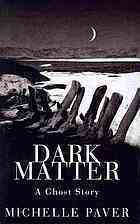 My Rating: 5 stars
My Rating: 5 stars
Dark Matter by Michelle Paver, not to be confused with the recent novel by Blake Crouch, is set in 1937 with the second world war looming. After reading it (on suitably gloomy, late November days) I will definitely NOT be setting off on any polar expeditions, especially any which include staying over the winter!
I always enjoy a good ghost story – Dark Matter is described as an adult ghost story – and this book certainly made me shiver. Not only because of its brilliantly described Arctic setting – Paver also takes us on a journey to the deepest, least-evolved regions of the brain where we are prepared to believe that the dark is not just the dark, and all our scientific advances and perceived progress count for nothing.
Jack, a somewhat embittered, poverty-struck, down-on-his-luck, stuck-in-rut young Englishman and a loner who hankers after a career in physics, seizes his chance to set off on a scientific expedition to the Arctic. (The splendidly horrible-sounding Gruhaken, a remote uninhabited bay in Norway.) The story is told as entries in Jack’s journal.
From a hopeful start in a wild, wondrous landscape full of possibility, things quickly deteriorate. The captain of the ship delivering the three men to their camp is clearly afraid of something nasty where they are headed. One of Jack’s two fellow expedition members seems to be a fledgling sociopath. Then Gus, the expedition leader, a dashing, handsome chap who Jack greatly admires, falls sick and Jack is left on his own to operate the wireless and keep the camp going – hopefully temporarily until the other two return, but this depends on whether or the sea ices over…
Faced with the threat of being stranded for months alone in a hostile, increasingly dark and icy wilderness, Jack, a rational man, is forced to confront himself and his fear of what may or may not be out there with him. For something seems to be haunting the camp, something he cannot explain, possibly connected to the ruins of a previous camp… Is he really alone? The evidence seems to point to there being an actual ‘thing’ present. Then again, can we trust that Jack is telling us the whole story? He becomes increasingly obsessive and superstitious, turning to alcohol as his fear and sense of aloneness increase.
This is a bleak novel at its heart. It’s also a compelling read. The mounting terror that Jack experiences gave me the willies and made me utterly glad that I live a long way from anywhere with total darkness. For in this inhospitable place in the encroaching darkness of the Arctic winter, with the sun only a glimmer below the horizon, the mind loses its rational veneer.
The battle between the rational and ‘irrational’ self is a central aspect of the book. We see Jack’s internal struggles to cope with what he learns and the situation he faces. ‘Dark matter’ by the way, for people not into cosmology is the term that describes the stuff in the universe that we can’t easily detect but must infer from observation. It’s also a sort of metaphor for the unknown stuff out there in the wild, and inside us. The landscape plays a big part in the book too – the natural world and living conditions are vividly evoked. Also there’s the wider idea of haunting, of the past continuing to affect the present, especially when it’s unwanted or contains horrible things. The first world war haunts the world of 1937, and there are things in his own history that Jack doesn’t want to face. In this isolated region of northern Norway worrying folk tales abound and past actions reverberate across time.
To be critical, which is difficult as this is so beautifully written, some of Jack’s decisions might seem unlikely to some, if not plain daft. But Jack is a flawed character, necessarily so, and I could go along with them – though I did yell at him in several places towards the end, ‘Don’t be so ****ing stupid!!’
I’d highly recommend this book to readers of historical or psychological fiction, and everyone who enjoys being seriously spooked.


November 12, 2016
On location & other things
This past couple of weeks location has been at the forefront of my mind. I’ve been compiling a video of the settings in Blind Side – a year ago when starting out on my journey with Unbound I rashly decided to make a video of the novel’s London locations a reward for those people who pledged for a guided tour but wouldn’t be able make it in person. Also I’ve been writing a post for the Trip Fiction website on my use of London as a setting for the book. More on both projects to follow.
At the risk of alienating my blog followers and anyone else who comes across this post – what a f***ing dreadful week it’s been.
First, the US election. An unashamedly devoted Obama fan for the past eight years, I recoil in horror at the thought of ‘President Trump’. Those two words are just not meant to go together in my view. I share the pain of my liberal-minded American friends who will experience his presidency first-hand. Fortunately for me, an ocean separates us… Then the news that the melancholy genius of Leonard Cohen is gone, his last words have been written. This has set off my gloom perfectly. It’s raining too, and my husband and I were wiping tears from our eyes as we listened to those haunting words once more.
Returning to locations before I get seriously depressed, here’s a few shots from the video (which contains both stills and video clips – I plan to post some snippets once I’ve upgraded my site):
 The Regent’s Canal
The Regent’s CanalThe video is more than a bit late – apologies to anyone who may have been impatiently awaiting it. My excuse is the sheer time it’s taken to get to photograph and film the locations (which I did this summer with my camera and an old iPhone) and get to grips with the software (Windows MovieMaker).
Several times while heaving sighs at the limitations of the software/my computer/my brain I’ve asked myself why on earth I decided to do this… Last weekend though, I finally got the hang of trimming, re-ordering, captioning and de-wobbling my video clips. I’ve added transitions and animations to some still shots. Now all that’s left to do is to add some narration and maybe background music.
 Boats on the canal
Boats on the canalThe Trip Fiction post will be published in a couple of weeks. While out and about photographing the settings I realised how much some have changed since I explored them in 2005, when I began writing my novel. King’s Cross is certainly a very different area now after its massive redevelopment. No more derelict land and decaying warehouses, nor could I find a greasy spoon or tatty pub like the ones I visited eleven years ago…
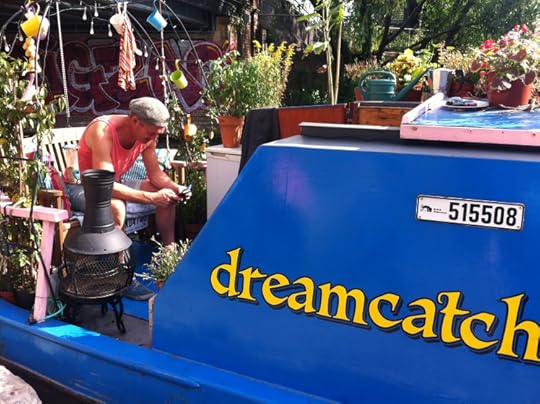 This is the life!
This is the life! A view from the Parkland Walk
A view from the Parkland Walk
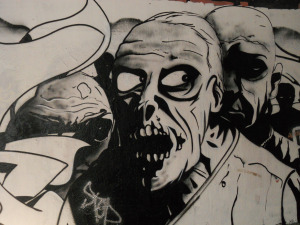
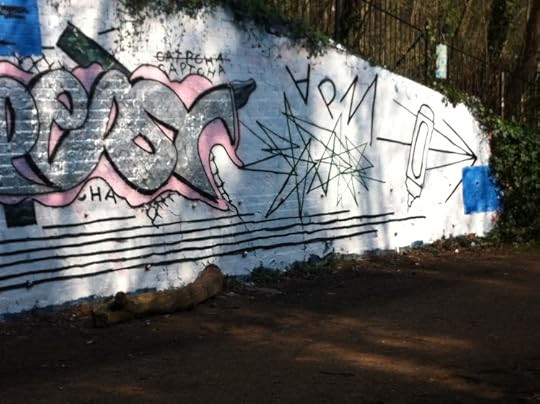 Features of the walk
Features of the walk
In other news
Reviews of Blind Side continue to be posted on Amazon.co.uk, Amazon.com, Goodreads and Library Thing. It gives me such a thrill to see how well the book been received (with a few exceptions, of course) and what in particular has struck readers. Thanks again to all those people who’ve shared their thoughts. Many pledgers on Unbound have now downloaded their copies – if you haven’t yet, here are the instructions: http://docs.unbound.co.uk/unbound-for-readers/managing-your-subscriptions/how-do-i-download-the-ebook
Some rather interesting and most welcome developments relating to my book are lurking in the wings:) I’m not able to share them just yet but will do so as soon as possible, promise.
Meanwhile, I’ll leave you with some a few questions – replies most welcome. Which books have you enjoyed with a strong sense of place? Do you really have to visit a location in person these days to write about it well? And is there anywhere that you would love to write (or read) about?


October 31, 2016
A Halloween Story
Just finished, here’s my Halloween offering to put you in the right mood.
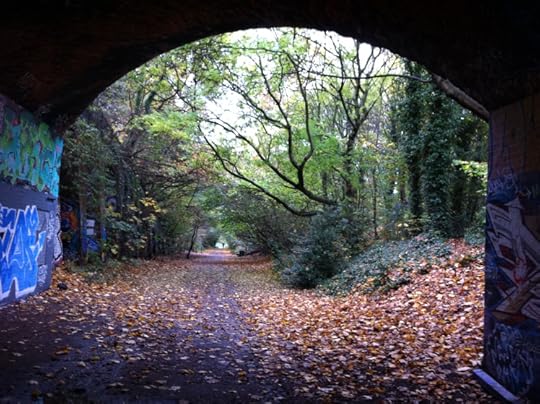
I used to love horror stories. As the days shortened, Mum would often find me lost in a book when I should have been tidying my room, enjoying the creepy thrill of the inexplicable. But since last Halloween, I can’t stomach them.
The wind makes little shushing noises, flinging up a rain of leaves. Above the houses, gold stains the sky.
‘Winston, come!’
I peer behind the spindly silver birches beside the path. No sign of his flopping ears and curly tail. He’ll be off in the undergrowth somewhere, chasing squirrels. I curse under my breath. Why the hell did he choose today to run off? Thanks Mum for insisting I take the dog out, just as I’m about to go upstairs to get ready. Now I’m going to miss everything.
For years my parents wouldn’t let me join my friends on Halloween. It’s just a stupid American thing, Dad would say when I used to ask to go trick or treating. You never know who might come to the door, there’s some creepy people out there. I think he meant people like the Polish family who moved in down the road a few years ago. He’s always going on about how the area has been changed since all that lot moved in. This year, probably because I’m nearly 16 and it doesn’t involve propositioning the locals, they said I could go on the zombie walk. I bought pale make-up and black eyeliner especially.
‘Blasted dog,’ I mutter, jogging back along the path, giving a wide berth to three teenage boys sitting on the steps below the bridge. They’re about my age. A whiff of weed comes off them, sweet and strong. Relieved they’re ignoring me, I push my hands down into the huge pockets of Dad’s jacket.
‘Winston!’
I think I see him sniffing around the rubbish bin and my fingers close over the handle of the dog’s lead. But when I get closer there’s no dog.
I slow as I go under the footbridge, straining to make out anything dog-shaped on the path ahead. There’s only a dark figure coming towards me. A man. My heart beats faster. I shouldn’t be out here alone, so late. But I can’t go home without the dog. When I came home without Winston’s choker, Dad had a meltdown. Someone took the choker off the dog? Tell me another one.
A bike rushes towards me and I skip out of its way. When it’s passed, the man has gone. I scan around the graffiti-covered skateboard ramp by the path and up towards the adventure playground but can’t spot him. I look up towards the high wall blocking the bank on the other side of the path. A little man crouches inside an arch cut into the brickwork, a few feet above my head. He’s almost hidden, his single bare leg thrusting out of the wall as if he’s about to leap onto me. The sprite. I shiver, thinking of the Stephen King story set in Crouch End. An American tourist I saw snapping the statue told me about it. I read it a few weeks later at the library – a visiting couple get lost and are attacked by some awful thing. The woman is never seen again.
I walk on, scouring the jungly patch above the path. It’s one of Winston’s favourite places. I bet he’s up there somewhere. But it’s almost dark now… Besides, tramps and gypsies live there. Dad says not to go near them.
‘Win-ston!’
A leaf flutters into my face, startling me.
Go on, I tell myself. You can’t just leave him.
The bank slopes up steeply. There’s no proper path. I peer into the mess of spiky stems, listening for the huff of dog breath. Two or three times I hear the rustle of paws on dry leaves. But there’s no dog in sight.
I stop suddenly. Something’s here, among the trees – thin branches tied together with strips of plastic bag. On the ground below, bed sheets and newspapers are spread out. Beside them is an empty Heinz baked beans can full of water and a comb with lots of missing teeth.
Close by, a twig snaps. My heart thumps so hard it hurts.
‘Who’s there?’
My voice is a pathetic whimper.
Just go. Now.
I imagine Mum’s downturned mouth, Dad’s veins popping out of his temples. You’ve done it again, haven’t you? You’ve been walking around in a daze like a fucking zombie. First you lose the fucking choker, then you lose the fucking dog!
Please God, let him be here. I try to whistle like Dad. A frail squeak comes out.
A low rumble begins. Like thunder, only it’s too late in the year. I can’t tell if it’s coming from below the ground or above – it’s everywhere, making my organs vibrate like I’m standing next to a massive loudspeaker.
Then silence. Behind the bushes, a faint glimmer of light. Something’s up here.
‘Winston?’
My voice is sucked into the gloom. I fight the urge to run. I’m rigid, my mouth dry. My body has become one huge ear.
There it is again. A raspy creak, faint but regular. Something moving to and fro, maybe. A child’s swing?
I step past a bush. Then I see it, lit by a gauzy patch of streetlight.
A man dangles from a branch. He’s about Dad’s age. His clothes are loose and raggedy and his boots don’t match. His face is oddly white like it’s been sprayed with paint or he’s stayed indoors too long. A cord is looped around the branch. Its end is attached to a chain around his neck. The silvery links glint at me.
My lungs don’t work properly. My breath comes in shallow gasps. I go closer. His black eyes hide in their sockets. They stare out but they don’t see.
Someone’s tacked a piece of cardboard to the trunk. In large, neat capitals:
NO PLACE HERE
FOR SCUM LIKE YOU
As I read something bounds into me. A scream builds in my throat.
Warm licks on my hands, a bark. Thank God. I pull out Winston’s lead and bend down to fix it to his choker.
It’s gone.
I look up at the man once more then run all the way home.
My parents didn’t believe me. After I said I’d call the police myself, Dad groaned and went to put on his jacket.
When he came back nearly an hour later, he laughed at me.
‘There’s no hanged man there,’ he said. ‘You’ve been dreaming again.’
Next morning he told me go to the pet shop and buy another choker. On the way, I looked for the man. Dad was right, there was no hanged man. No shelter either – I searched for ages to make sure. There was only an ashy heap on the ground and a smell like burnt hair that stayed with me for days.


October 14, 2016
The Friday Interview: Stevyn Colgan on the funny side of murder
 My guest today, Stevyn Colgan, is writer and researcher on the popular TV programme QI. After several non-fiction books, his first novel A Murder To Die For is 92% funded and looks like hitting 100% any day now. It is expected to be published by Unbound in 2017.
My guest today, Stevyn Colgan, is writer and researcher on the popular TV programme QI. After several non-fiction books, his first novel A Murder To Die For is 92% funded and looks like hitting 100% any day now. It is expected to be published by Unbound in 2017.
Tell us a little about your background and career so far, and how you came to be crowdfunding your first novel with Unbound.
I grew up in Cornwall and had every intention of either going to art college or catering college. But then I somehow got into a drunken £50 bet with my homicide detective father that I couldn’t survive six months as a cop. Next thing I know I’ve moved to London, put on a funny hat and started pounding the beat. And I enjoyed it so much I stayed for 30 years! However, my natural curiosity and fascination with human behaviour led me to challenge certain accepted truths about policing. Eventually I ended up being part of a specialist team at New Scotland Yard exploring new and innovative ways of tackling crime and disorder – like using lollipops to quieten noisy clubbers, or wizards to bring down illegal street gamblers etc. It sounds weird but so many of these ideas were successful that I ended up on a Home Office advisory committee, and the tools and techniques we developed are now standard policing practice. I tell the story of those days in my last book Why Did The Policeman Cross The Road? As for the writing, it’s something I’ve always done as a hobby. It’s my abiding passion; the thing I always come back to. My first book, Joined-Up Thinking was published by Pan Macmillan while I was in my final years as a policeman. I’ve had two other non-fiction books published since but what I’ve always wanted to do is tell stories. I’ve actually written 18 novels but none have been published until now. So I’m using A Murder To Die For to test the waters – it’s the first fiction book from my ‘back catalogue’ that I’ve put up to a publisher. And I chose Unbound as I published my last two books with them.
You’ve written about the writing process, ‘It’s been a labour of love trying to write something as twisty-turny as an Agatha Christie plot while also throwing in some savage slapstick set pieces of the kind I love to read in other comedy novels.’ Tell us a little about how you managed to do this and the difficulty of combining these elements in a novel.
It wasn’t as difficult as it sounds. The comedy naturally emerged from the various scenarios in the story. The hardest part was writing a sufficiently complex – but plausible – murder mystery plot that could keep all of my characters (and readers) guessing until the very last chapter. You soon start to respect someone like Agatha Christie who managed to do it for some 60+ novels. One thing I did have some fun with was the ‘rules’ of writing crime fiction. Back in 1929, the British author and theologian Ronald Knox made an attempt to create a ‘Ten Commandments for Detective Fiction’ and I thoroughly enjoyed testing them. How would they square up against the reality of modern homicide investigations? You’ll have to read the book and see for yourselves! I also set myself the challenge of incorporating parts of my late father’s unfinished murder mystery novel into A Murder To Die For. Dad died cruelly young from a heart attack at the age of just 51 and just a few chapters into writing his first novel. As this year marks the 25th anniversary of his death, I decided to commemorate him by getting some of his words into print. What I did was to use his prose as the prose of the fictitious author Agnes Crabbe whose work is central to the plot. I was even able to use the general plot line of Dad’s book as an important strand in my own plot. It should look pretty seamless. And I know that he’d have loved the idea.
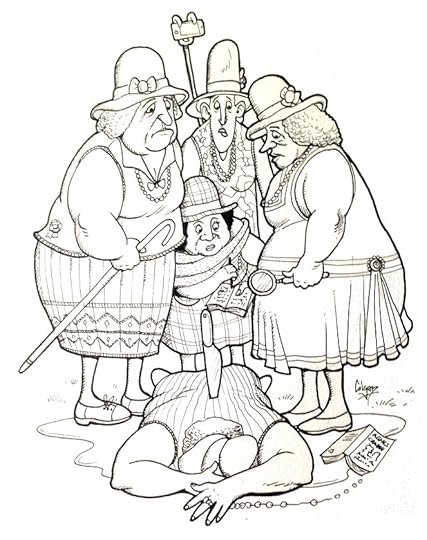
What made you write a comic murder mystery novel?
I find it very hard to write anything terribly serious as I’m not a terribly serious person. I’m optimistic, gregarious and I find the humour in pretty much any situation – a welcome safety valve during some pretty hairy times when I was a cop. It also helps with writing the scripts for QI and The Museum of Curiosity of course! The idea for a comedy murder mystery grew out of a pub discussion (as all the best ideas do) with some non-police friends. I was explaining why I don’t watch cop shows – procedurally they are nonsense and their accuracy is usually appalling. Things like ‘good cop/bad cop’ during interviews for example. That breaks the rules of evidence as any information gained under threat or duress will be inadmissible at court. However, I do love murder mystery because it’s a world removed from real life. It’s generally very silly and melodramatic, like a game of Cluedo made real. And it suddenly occurred to me that there might be a great deal of humour to be milked from throwing the two genres at each other – real policing versus murder mystery. One of my favourite TV shows is Midsomer Murders because it does just that; it straddles the two genres. It’s filmed around where I live on the South Bucks/South Oxon border so it’s fun to spot the locations. But what really attracts me to Midsomer – apart from the appalling crime rate for such a small county – is the ingenuity of the crimes. While Det Ch Insp Barnaby appears to be a modern cop investigating a homicide, the circumstances of those deaths are pure golden age murder mystery! My favourite ever is an episode called Hidden Depths where the murder is committed by a man being staked out on his croquet lawn and then being bludgeoned to death by his disabled wife firing his wine collection at him with a replica Roman trebuchet (a kind of catapult)! Or that great episode where Martine McCutcheon is crushed by a giant wheel of cheese. Or the episode where Phyllida Law is killed when a towering pile of newspapers is pushed on top of her by her dotty husband Edward Fox. Genius!
You wrote this about A Murder To Die For: ‘The subsequent clash of cultures between the procedurally-driven police (a world I know a great deal about having once been a London Police officer) and the murder mystery obsessed fans is where much of the comedy comes from.’ This could be hilarious, I can imagine. Could you attempt to define further the type of comedy in the book? (I know that’s a hard question!) Are there particular characters in your book which provide greater scope for comedy than others?
I wanted to write a good farce. Farce is comedy that involves situations that are highly exaggerated, extravagant and improbable but grounded in the real world. Think Fawlty Towers, for example. What could be more mundane than a mid-range seaside hotel? But throw in a series of misunderstandings, some decent slapstick and a cast of eccentric characters and you have comedy gold. Tom Sharpe’s books are all classic farce. I guess the most famous is Wilt – the story of mild-mannered Henry Wilt who is so dominated by his wife Eva that he acts out a fantasy of murdering her by dumping a fully clothed sex doll down a hole on a building site. Unfortunately the doll is spotted just as thousands of tons of concrete is poured on top and, with perfect bad timing, Eva goes missing. A simple drunken act degenerates into delicious farce. I’ve set A Murder To Die For at a murder mystery convention where nearly everyone is dressed as a particular fictional lady detective – including the victim, witnesses and very possibly the murderer. Throw in the fact that there is rampant rivalry between fan clubs and you ramp up the potential for comedy. And then to have them all trying to investigate the crime at the same time as the police … it almost wrote itself! The fans were great characters to play with and I had a good mix of the obsessive and dotty and passionate. The cops too were fun and were all based on people I’ve worked with or were amalgams or several people. I have a retired cop who is laid back and does things the old-fashioned way. I have a modern, procedurally-driven and promotion-obsessed cop. And I have a lateral thinking cop who has an extraordinary way of piecing disparate facts together to discover the truth. To have these three also at loggerheads gave me even more comedy to play with. All the best comedy comes from conflict and misunderstanding.
Which writers do you most enjoy reading and which have influenced you the most, would you say?
I am something of a magpie and a very eclectic reader. I usually have two or three on the go at once; at this moment I’m reading Andy Hamilton’s first novel The Star Witness, Jason Arnopp’s The Last Days of Jack Sparks and Laurie Winkless’s Science and the City – a comedy, a supernatural thriller and a book about the infrastructure of urban living! I do like to mix things up a bit. When it comes to influences, however, they are many. I never tire of P G Wodehouse, Douglas Adams and Tom Sharpe. They have probably been my greatest influences. I also love almost anything written by Willie Rushton, Harry Harrison, Dorothy L Sayers, Spike Milligan… the list goes on and on. I read a lot of non-fiction too and particularly love books by people like Mary Roach, John Ronson, Stephen J Dubner and David Grann. My influences extend to other media too. I listen to a lot of radio comedy and audiobooks – Kenneth Williams’s reading of Cold Comfort Farm is one of the best things ever – and I watch a great many old classic British comedies. If it was made in the 1950s and features people like Terry-Thomas, Peter Sellers, Alastair Sim, Joyce Grenfell, Alec Guinness, Joan Sims, Dennis Price, Peggy Mount, Bernard Cribbins… I can almost guarantee that I’ve seen it!
Are comedy novels less popular than they used to be do you think? Are readers less interested in reading comedy?
I don’t think that they’re less popular. They’ve just been relegated to specific parts of the market. Most of the best comedy in recent years has ended up in two camps: sci-fi/fantasy and women’s fiction. The great humorists of the past decade or so have been people like Douglas Adams, Terry Pratchett and Jasper fforde, or like Helen Fielding, Sophie Kinsella and Jenny Colgan (and yes, we probably are related in some way as the Colgan clan is quite small). Mainstream comedy in books does seem to have died a little but that’s maybe because we’ve lost most of its brightest stars; only relatively recently we’ve said goodbye to people like Tom Sharpe, George MacDonald Fraser and David Nobbs. And, of course, Douglas and Terry, both of whom I was lucky to meet and, in Terry’s case, work with. There are still some fantastic comic novels being produced by writers like Michael Frayn, John Niven, Jonathan Coe, David Lodge and others but nowhere near as many as we used to enjoy. I think it’s time for a resurgence. The world can be a miserable place at times. A smile and a chortle on the commute to work can only be a good thing!
I’ve heard people say that comedy writing (in novel form particularly) is more difficult to sell to publishers and readers than other genres because what’s funny is inherently more subjective than say what is suspenseful or chilling. Is that true in your view?
It is definitely true because, as you say, humour is subjective. For example, I recently started reading through the books of Nicholas Salaman. If you believe the cover blurbs and literary reviews, he’s the funniest writer who ever lived. But, while I will happily say that I enjoyed them all and they made me laugh, they didn’t make me laugh as much as books by other authors have. It may be a different story for other readers. TV comedy is the same; look at Mrs Brown’s Boys for example. Millions love it. Millions hate it. There’s no right or wrong with comedy. But it does mean that you have to find your audience. Publishers have to make money to stay afloat – especially in an age of online publishing – and so they will be naturally inclined to take on the books most likely to generate the best profits. Comedy is always a risk because it can’t be all things to all people like a thriller or a horror story can. But, in recent years, it seems that it’s been the accountants rather than the publishers who have been calling the roost. What else would explain anyone shelling out quarter of a million for the biography of the dog that won Britain’s Got Talent?
Is it harder these days for new comedy novelists to get their names known? Are publishers less willing to take risks on them? And do you think this is a good time for new comic novelists to emerge?
Interestingly, the first novel I pitched to Unbound was a completely different one! They liked it a lot and said ‘Let’s do it!’. However, at our first actual meeting, they asked me if it was a one off or whether it was part of a series. I told them that I saw it as part of a trilogy of books all set in the same fictitious county with certain characters appearing in two or more of them. When I described the plots of Book 2 and Book 3, the guys at Unbound said ‘We want Book 2 first!’ Their reasoning was sound – Book 2 was a comedy murder mystery and, while comedy is quite difficult to sell, murder mystery isn’t. They reckoned, therefore, that it would give me the best chance, as a new fiction author, of making some kind of impression on readers. Plus the fact that I used to be a cop helps by adding a layer of credibility. I genuinely have worked on homicide investigations. So Book 2 became Book 1 and Book 1 will now be Book 2 if Book 1 does okay. Keeping up? I think this is a good time for comedy novelists because the field is so clear. Plus, there has never been a better time to get your work snapped up by TV production companies or movie makers. There are so many TV channels now and everyone is looking for the next funny series or film. If your book is suitable for dramatisation, you stand a great chance of it happening. I’m certainly working on some pitches for the novel right now.
How far off are you now from your crowdfunding target? When will A Murder To Die For go into production?
As of today, October 12th, I’m 88% funded so I’m nearly there. The book is written and it’s been proofread and critically read by a talented and knowledgeable bunch of friends. I’m hoping, as long as I’m fully funded before the Christmas break, that Unbound can get A Murder To Die For edited, proofed, typset, designed and printed for May 2017 to catch the Summer holiday readers market. Meanwhile, January will see me back hard at work researching and writing the new series of QI. But that’s always a joy, never a chore – rather like writing novels.


October 4, 2016
The ghosts behind ‘Ghost Variations’
Today I present a special guest post by Jessica Duchen author of Ghost Variations (20 September 2016, Unbound) about the spine-tingling and captivating historical circumstances on which her novel draws.
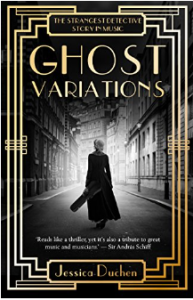 Oujia boards, messages from dead composer Robert Schumann, a lost final concerto and a talented violinist heroine who attracted the finest composers and musicians… This piece has well and truly whetted my appetite for the book, as I imagine it will yours! So, over to Jessica.
Oujia boards, messages from dead composer Robert Schumann, a lost final concerto and a talented violinist heroine who attracted the finest composers and musicians… This piece has well and truly whetted my appetite for the book, as I imagine it will yours! So, over to Jessica.
I first spotted the name “Jelly d’Arányi” so long ago that I don’t remember the context. But I do remember my reaction. Her name was JELLY? I guess that’s what most people think. Of course, it’s not Jelly as in jelly-and-ice-cream; it’s pronounced Yelly, as in yelling. It’s still bizarre, though, and it’s not even particularly Hungarian. I’ve been stumbling across traces of her in one sphere or another almost my whole life – but never imagined that she would become the heroine of one of my novels.
Still, there she is: Jelly d’Arányi, the violinist who inspired some of the greatest music written for her instrument in the first quarter of the 20th century. Born in Budapest 1893, she died in Florence in 1966, but spent most of her life in Britain. She pops up in music history books, concert programmes, sheet music. Ravel’s virtuoso showpiece Tzigane is dedicated to her. Bartók fell in love with her. The elderly Elgar had a crush on her. She worked with Pablo Casals, Myra Hess, Sir Adrian Boult: musicians as legendary as she was. She might sidle into view, too, in accounts of the world in which she moved: the Bloomsbury set, aristocratic households, ambassadorial ones, intellectual ones even though she scarcely went to school.
She was friendly with George Mallory before his untimely death on Mount Everest, and with Aldous Huxley, who seems to have put a tongue-in-cheek portrait of her into his novel Crome Yellow. She was close friends with “George” Yeats, the wife of the poet WB Yeats, whose esoteric interests were many and varied. And she her sisters Adila (known by her married name, Fachiri) and Hortense were everyone’s “darling little Hungarians” when they first settled in the UK a few years before World War I. A painting of her by Charles Geoffroy-Dechaume hangs in the National Portrait Gallery.
A recording of Jelly d’Arányi playing Gluck’s Orfeo ed Euridice
Although she appears often in other people’s biographies, she was rarely accorded one of her own, other than The Sisters d’Arányi, by Joseph Macleod, written in the mid 1960s. The author’s affection for the by then elderly violinist and her vivid, humorous personality, somewhat disengaged from the world around her, is unmistakable. But the book includes a chapter headed “The Truth about the Schumann Concerto”. I read it, and nearly fell off my chair.
It seems that in 1933 Jelly received a message via a Ouija board purporting to be from the spirit of the composer Robert Schumann, asking her to find and play a violin concerto of his that had not been performed for many years. She had never heard of it before and her enquiries soon proved that it was real, but suppressed and held in a library in Berlin. After Schumann’s death in an asylum near Bonn, his wife, Clara, had decided to leave the piece unpublished, believing that it betrayed traces of her late husband’s mental illness.
The remaining Schumann family insisted the work must not be published, and there seemed little that Jelly could do. But she had drawn attention to the work’s existence, and as the Third Reich tightened its grip on Germany and banned the music of Jewish composers, the Ministry of Propaganda devised a special use for the missing concerto. Meanwhile the publisher, Schott’s, sent a photostat to the most newsworthy young violin star of the day, Yehudi Menuhin, who fell in love with the piece and wanted to give the first modern performance himself. Jelly, having started her quest with the most innocent of intentions, found herself sucked into a race to the premiere with Menuhin on the one hand and, on the other, Joseph Goebbels.
But meanwhile, her sister Adila and her friend Erik Palmstierna, the Swedish Minister in London, both avid spiritualists, also seized on the concerto for their own purposes. When the news of the “spirit messages” broke to a derisive public in September 1937 via a book by Palmstierna based on messages that Adila had channelled, Jelly had to disentangle herself from a controversy that wouldn’t have been out of place in the fiercest Twitter storms of 2016. She eventually gave the UK premiere of the Schumann Violin Concerto in February 1938 – but neither she nor her world would ever be the same again.
This was clearly a novel waiting to be written. I was fascinated by the confluence of heroine, topic and time. This was the 1930s, with the world on the cusp between peace and war. Schumann had written the concerto when he himself was about to tip from mental instability into a full-blown breakdown and suicide attempt. And Jelly, who turned 40 in 1933, was watching her own glittering career slide out of control as a succession of mishaps, injuries and mental stresses assaulted her. All of them were at the tipping point together.
The novel spans five years in Jelly’s life and writing it has spanned five years of mine. During that time I’ve watched food banks open in otherwise affluent parts of London where people can’t afford to eat; the rise of a dangerous nationalist in the US hell-bent on becoming president; and the UK making a myopic and self-destructive move to leave the body of unity that has ensured peace for some 70 years. We’re not living in a rerun of the 1930s; the differences today are as clear as the similarities. But I sense the echoes and I don’t like it much.
Yet Schumann has the last word. The final movement of his violin concerto is a Polonaise: a Polish national dance. The concerto’s modern premiere was given (not by Jelly!) in front of Hitler. Less than two years later he invaded Poland and World War II was declared. Yet the music’s triumphal conclusion held the seeds of defiance and victory. Ultimately fascism would be defeated. The spirit of freedom and humanity would survive all the tragedy and destruction and win through in the end. Music may not bring peace, but it can fly the flag for it directly under a dictator’s nose. Long may it continue to do so.
To buy Ghost Variations
Amazon: https://www.amazon.co.uk/Ghost-Variations-Strangest-Detective-Story-ebook/dp/B01LW6HZV6
Unbound: https://unbound.com/books/ghost-variations
Author website: http://www.jessicaduchen.co.uk





